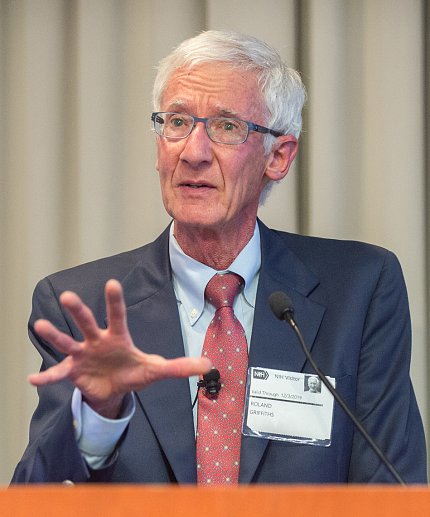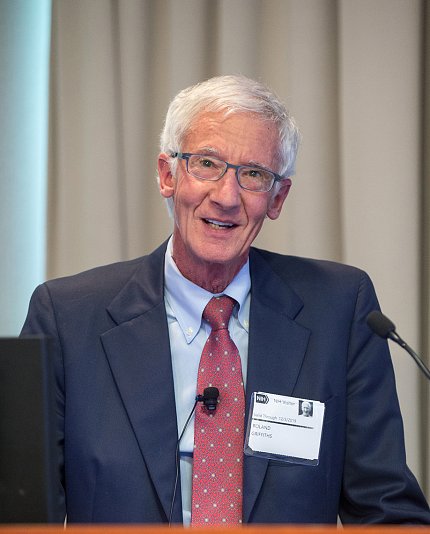Psilocybin Might Aid in Treatment of Mental Disorders, Addiction

Photo: Leslie Kossoff
The hallucinogenic compound psilocybin could help treat depression, anxiety and substance abuse, said Dr. Roland Griffiths at a recent NIMH Director’s Innovation Speaker Series lecture at the Neuroscience Center.
“We have a class of drugs that was put in the deep freeze—not studied for a period of decades. Now, we can pull them out and ask all sorts of questions,” said Griffiths, founding director of the Johns Hopkins Center on Psychedelic and Consciousness Research and professor of behavioral biology in the department of psychiatry and behavioral sciences and the department of neuroscience at Johns Hopkins University School of Medicine.
Psilocybin is a psychoactive compound made by certain types of mushrooms. When ingested, it produces changes in perception, emotion and cognition.
Anthropological evidence suggests that various cultures have been using psilocybin for hundreds, if not thousands, of years for religious and healing purposes, Griffiths said. In the 1950s and early 1960s, researchers began studying the compound’s potential for the treatment of mental disorders. By the next decade, research ground to a halt in response to safety concerns coupled with unfavorable media coverage, resulting in misperceptions of risk and passage of highly restrictive regulations.
It’s thought that psilocybin destabilizes established neural networks, allowing the connection of new neural networks. The compound might permit the rewiring of brain networks that play a role in psychiatric disorders, similar to “resetting a computer.”
Griffiths said psilocybin decreases activity in the default mode network, a brain network associated with self-referential processing—the act of thinking about oneself. Such decreases in default mode network activity have also been observed in long-term practitioners of meditation. Increases in default mode network activity have also been observed in people with depression.
Psilocybin isn’t considered addictive because it doesn’t cause uncontrollable drug-seeking behavior, noted Griffiths. Medical emergencies as a result of taking the compound are rare.
“Despite the apparently low risk for toxicity and addiction, there’s nonetheless concern about use of psilocybin,” he explained. “That’s based primarily on concerns about adverse effects, such as panic reactions and possibly the precipitation of enduring psychiatric conditions.”
A few years ago, Griffiths surveyed almost 2,000 people who had taken psilocybin about the worst experience they ever had on the drug. Eleven percent indicated they put themselves or someone else at risk of physical harm, 3 percent sought medical help and 10 percent reported enduring psychological symptoms lasting more than a year. These adverse effects are uncommon in clinical studies where patients are carefully screened, prepared and given psychological support during and after the psilocybin session, he said.
Since Griffiths began his research 2 decades ago, his lab has treated more than 370 patients across 700 sessions. His lab has studied healthy volunteers, meditators, religious professionals, psychologically distressed cancer patients, cigarette smokers who wanted to quit and patients with major depressive disorder.

Photo: Leslie Kossoff
Study participants take a capsule containing psilocybin in a comfortable, living room-like setting under the supervision of two people who monitor the event. Conditions are optimized to maximize the potential therapeutic effect.
During sessions, participants are encouraged to lay down on a couch, listen to music and direct their attention on their inner experience. It takes about 30 minutes for psilocybin to take effect, with peak effects occurring at 2 to 3 hours and then tapering off over the next few hours. The monitors generally don’t intervene unless participants become anxious or uncomfortable and require reassurance.
Even though these experiences can be highly valued, Griffiths cautioned they are not “feel-good experiences.” They can be “among the most terrifying of your life.” It’s not uncommon for people to have brief frightening experiences that open into positive ones.
During the preparation phase, the monitors build rapport and trust with participants, so they feel safe during the session.
After their experience, Griffiths asks how their day went and “a very common response is ‘I can’t possibly tell you,’” because “they don’t even have a language to describe this experience.”
Not being able to describe it is a feature of a mystical-type experience, he noted. The other features of the experience are a sense of unity accompanied by a sense of preciousness, sacredness or reverence, the feeling that one is encountering ultimate reality, deeply felt positive mood and the transcendence of time and space.
“Mystical experience is defined by a constellation of empirically measured phenomenological dimensions,” he said. “It does not imply supernatural or unknown rational levels of explanation.”
Such mystical experiences are associated with enduring positive changes in attitudes, moods and behavior. In several studies, researchers predicted a decrease in anxiety and depression and a reduction in cigarette cravings.
The most interesting feature of taking psilocybin and similar compounds, according to Griffiths, is that the resultant memories and positive attributions don’t diminish long-term. Anecdotally, participants rate these experiences to be among the most personally meaningful of their entire lifetime, comparing it for instance to the birth of their first child or the death of a parent.
Another valued part of these experiences is that people often report having highly valued psychological insights. Griffiths said this may take various forms, such as insight into personal problems or in the realm of interpersonal relationships.
Recently, the Food and Drug Administration designated psilocybin as a “breakthrough therapy” for treatment-resistant depression and major depressive disorder. The designation is meant to speed up the development and review of a drug if preliminary evidence suggests it might demonstrate substantial improvement over available therapy.
“There’s something about these experiences that is fundamentally reorganizational and powerful. Although much more pre-clinical and clinical research is needed to understand biological and behavioral mechanisms of action, it appears plausible that variations of this therapeutic approach may demonstrate efficacy across a wide variety of psychiatric disorders,” Griffiths concluded.
